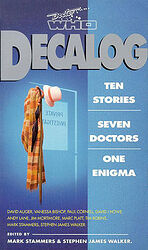
There are 2 reviews so far. To add a review of your own for this item, visit the voting page.
| By: | Chris Arnold, Bundaberg, Australia |
|
| Date: | Friday 1 August 2014 |
|
| Rating: |    8 8 |
I quite liked the overarching plot strand of the detective and psychic. On first reading years ago I was genuinely surprised at the twist but on second reading it is a little cliché and easy to spot.
Standout stories for me were Fallen Angel (although I'm not really sold on the Time Lord prison stuff, the characterisations were excellent), The Straw That Broke the Camel's Back (A nice evocation of season 7) and Lackaday Express (I didn't quite get it the first time but is well worth re-reading. A thinker for sure).
Clangers were The Duke of Dominoes (the strange and ethereal plot was confusing) and Prisoners of the Sun (an excellent idea for a story but I found it a little unengaging) with the rest of the group being fairly solid and dependable reads. I kind of liked the humour of the First Doctor Steven and Dodo in The Golden Door, and Peri is served well in Fascination.
Poor old Sixy gets the rough end of the deal, only appearing in The Golden Door (sharing the page count with the aforementioned First Doctor team), but other than that each doctor is represented well. A strong start for the Decalog series and for Doctor Who in the Short Story medium as a whole.
| By: | David Layton, Los Angeles, United States |
|
| Date: | Saturday 11 January 2025 |
|
| Rating: |    6 6 |
This first official collection of Doctor Who short stories has interesting ideas, but does not come off quite right for me as a whole. The idea is to use a frame-tale structure rather than simply have a collection of stories. The problem is that the frame tale itself sets up an expectation that all the stories will be connected and progressing toward a revelation of a central mystery. This promise, the book does not deliver on as only one of the stories actually bears a direct relationship to the frame tale. The set up is that Doctor 7 wanders into the office of a private detective in 1950s Los Angeles. We know he is Doctor 7, but he doesn't because he has lost his memory. He wants the detective to retrace his steps so that he can find out who he is. Also, a cylinder of some kind seems very important to him. So, the detective (who just happens to be British? for some reason, as in what the hell is a British guy doing as a Los Angeles detective?) instead of doing detective stuff takes his mystery client to a weird old house where a psychic lives, and the psychic does the detecting courtesy of holding onto objects from The Doctor's pockets that will supposedly reveal who he his. Each object, then, becomes the occasion for the psychic to "tell" a story. The lost memory trope seems pretty lame, and fortunately there is a payoff at the end so that it is not so lame as it seems. What is and remains lame is the psychic. That's me, I'm a skeptic. I just cannot buy into the magical psychic powers rigamarole.
On to the stories themselves. The best, by far, is Jim Mortimore's "The Book of Shadows," a cleverly constructed time paradox tale involving Barbara and Doctor 1 in which she gets split into two incarnations at roughly the same time, with devastating consequences for history. The worst, by far, is Vanessa Bishop's "The Straw That Broke the Camel's Back," a pointless exercise that has The Brigadier and Doctor 3 in the early days, not merely disagreeing, but actively despising each other, with Liz caught in the middle. The story is not true to any of these characters, and makes no sense of what happens in later seasons. David Auger's "The Golden Door" is an amateurishly written 2-Doctor story (1 and 6). Tim Robins' "Prisoners of the Sun" attempts to be modernist by using a multiple universes device, but the many leaps and shortcuts force him to leave out crucial details. It probably would have worked better if it were longer and slower paced. Apart from Mortimore's story, the other story worth a second read is Paul Cornell's "Lackaday Express." I am not usually an admirer of Cornell's writing, which I often find too fan-oriented and cliché-ridden. This story, however, is, despite a few flaws, quite interesting as a better-written disjointed narrative than Robins' story. It has Doctor 5 rescuing a young woman who is reliving pieces of her life in a constant loop. The swapping between her perspective, in first person, and the third-person narrative of The Doctor provides interesting contrasts and builds the mystery well. The science behind this is more than just a little off, despite all the sciency language Cornell throws around, and the young woman strikes me as rather petty and selfish, but the concept as a whole is intriguing, and Cornell does not oversell it.
In the end, the collection is like the box of knick-knacks one buys at a flea market: a couple of interesting items plus much dross.


